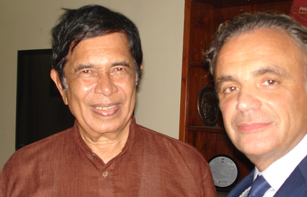
Dr Luiz Loures, UNAIDS Deputy Executive Director, Programme (right) with Mr Oscar Fernandes, Union Minister for Road Transport and Highways.
India’s rapid progress in expanding access to antiretroviral treatment over the last five years was heralded as “an example of national commitment and strategic action on AIDS,” by UNAIDS Deputy Executive Director, Programme, Dr Luiz Loures, during a mission to the country from 26-27 August.
The number of people living with HIV in the country receiving anti-retroviral therapy approximately doubled from 2007 to 2009 and then again from 2009 to 2012. India is now ranked second globally in terms of total number of people receiving life-saving drugs. Currently more than 650 000 people living with HIV are receiving treatment in the country and efforts are underway to ensure that 1 million people are covered by the national treatment programme in a short time frame.
Dr Loures congratulated the Ministry of Health and Family Welfare and the Department of AIDS Control for their firm commitment and leadership and their on-going efforts to strategically expand the national HIV response. Over the previous decade, India’s efforts in the AIDS response have reduced the number of new HIV infections by more than 50%.
India’s national AIDS response programme has secured results; it is one of the big global achievers.
UNAIDS Deputy Executive Director, Programme, Dr Luiz Loures
“India’s national AIDS response programme has secured results; it is one of the big global achievers,” he said. “Not only has it significantly expanded coverage of HIV prevention initiatives, but equally is placing emphasis on increased access, availability and coverage of HIV treatment and care services.”
Dr Loures emphasized the need for India to continue to capitalize on the gains achieved and ensure that investments are focused where they are most needed. “To realise greater impact across the country, India’s focus on strategic investments tailored at sub-national level—that consider local contextual realities—is critical. This strategy will be a game changer in influencing the epidemic’s future trajectory,” added Dr Loures.
Among other issues debated with the high-level officials, significant focus was given to the growing anticipation of India’s ability to meaningfully contribute to the global AIDS response and potentially supporting other countries in designing and delivering activities, through transfer of knowledge and exchange programmes.

L to R: Oussama Tawil, UNAIDS Country Coordinator, India; Mr J.D. Seelam, Union Minister of State for Finance; and Dr Luiz Loures, Deputy Executive Director, Programme, UNAIDS.
“We encourage India to continue partnering with other countries on sharing experiences, knowledge and transfer of competencies,” said Dr Loures. “With an ever-increasing interdependence between populations, shared goals can be realised more effectively and efficiently though meaningful collaboration and partnership.”
Dr Loures’ visit to India was an opportunity for high level policy dialogue with political leaders and Government officials, including the Secretary and senior officials from the Department of AIDS Control. Key discussions were held with the President and the Secretary General of the Forum of Parliamentarians on AIDS, Mr Oscar Fernandes, Union Minister for Road Transport and Highways and Mr J.D. Seelam, Union Minister of State for Finance. Both leaders pledged their full support to enhancing India’s contribution to the AIDS response, globally and within India.





